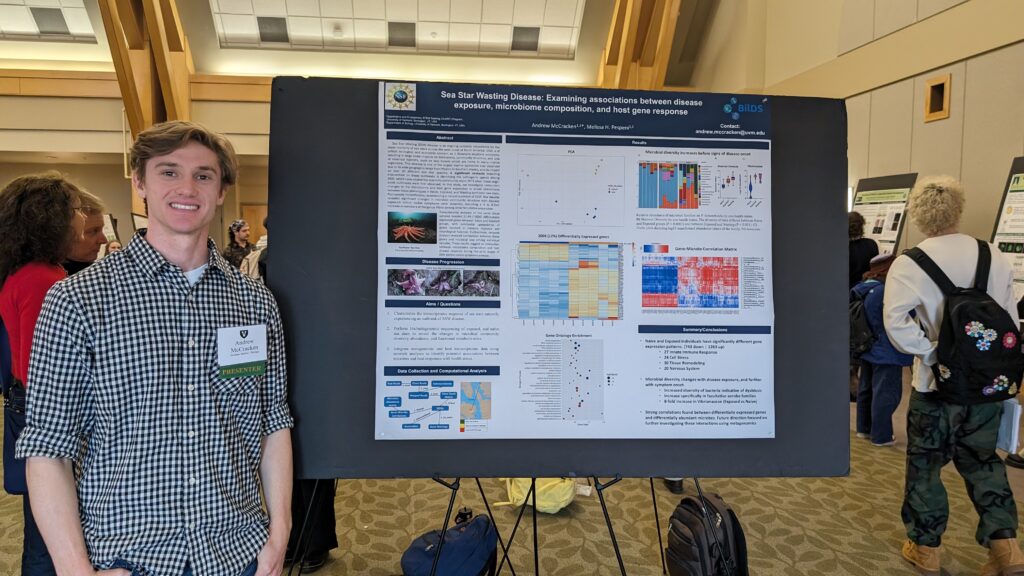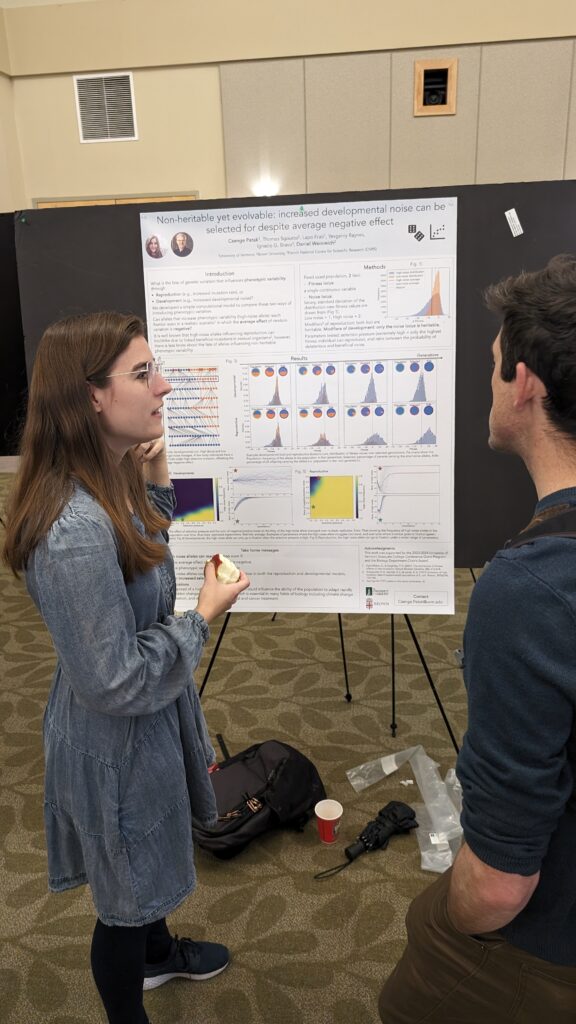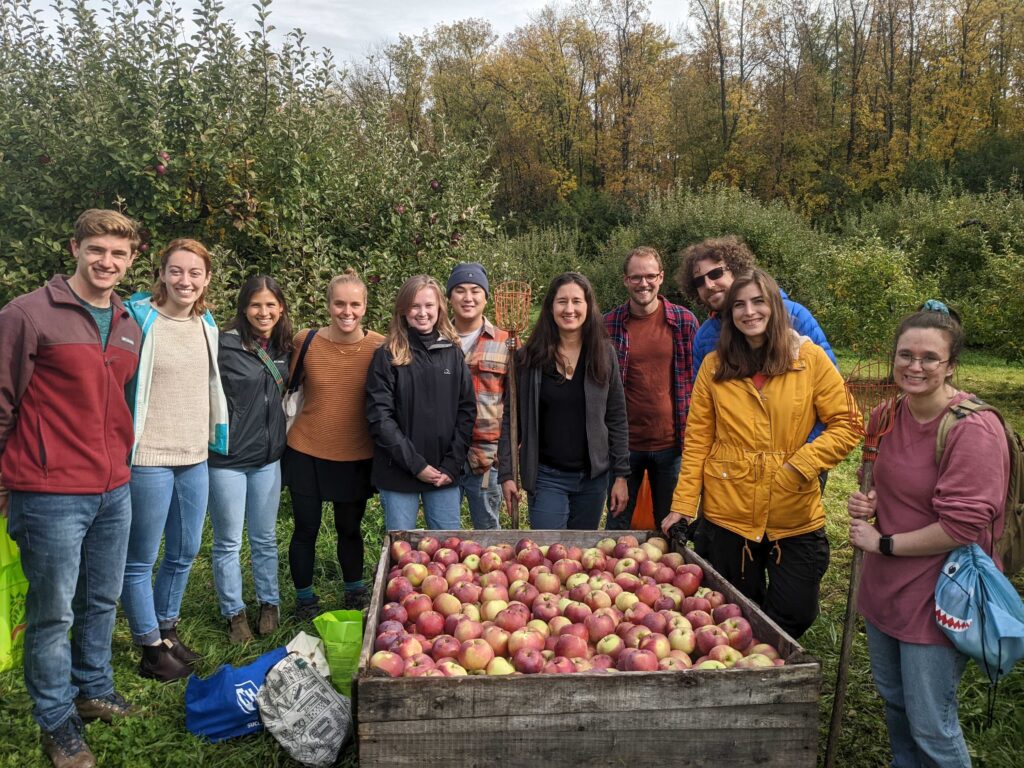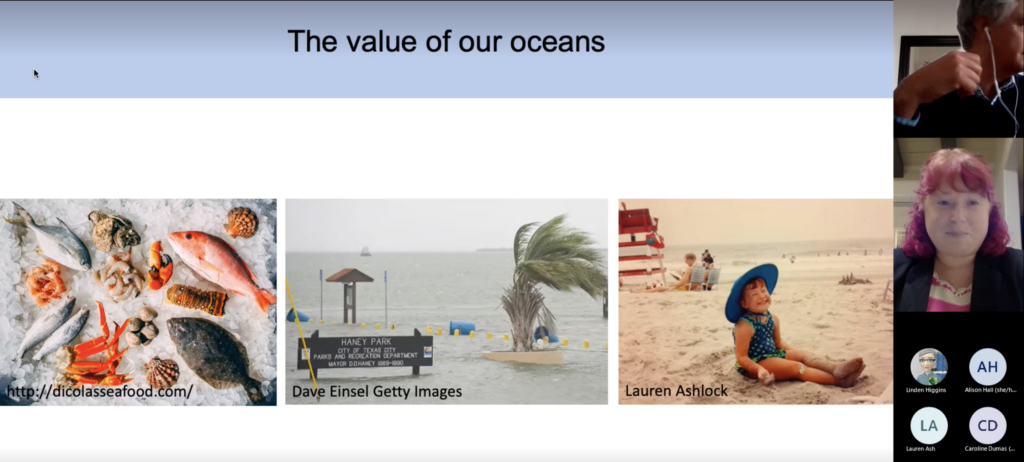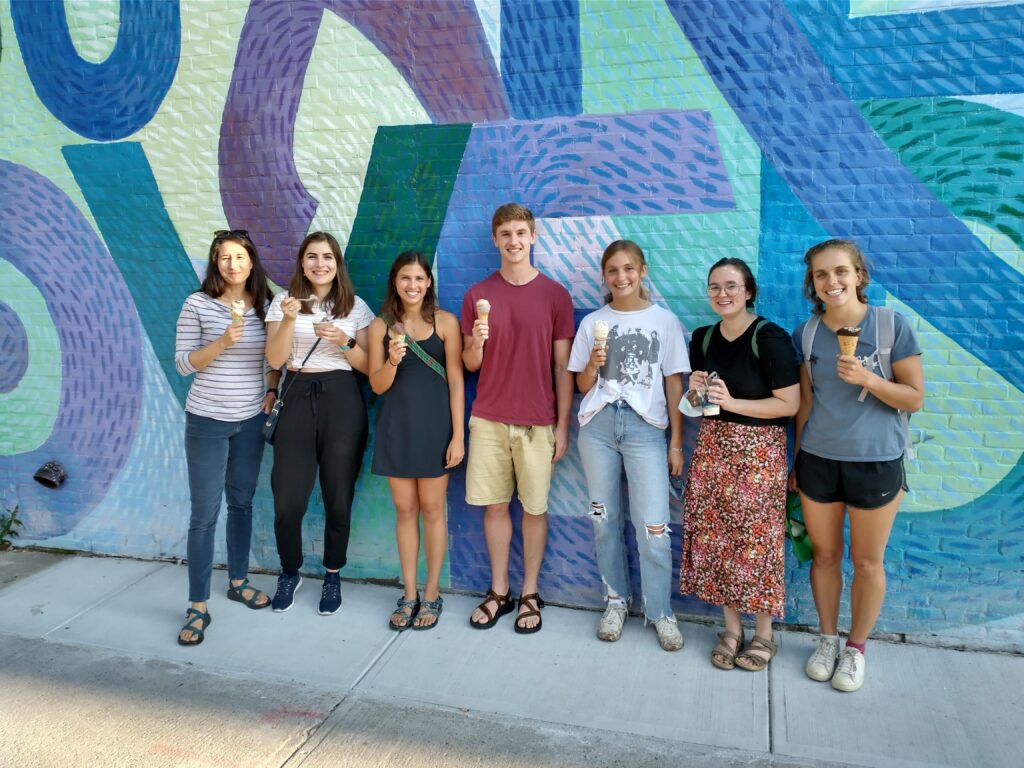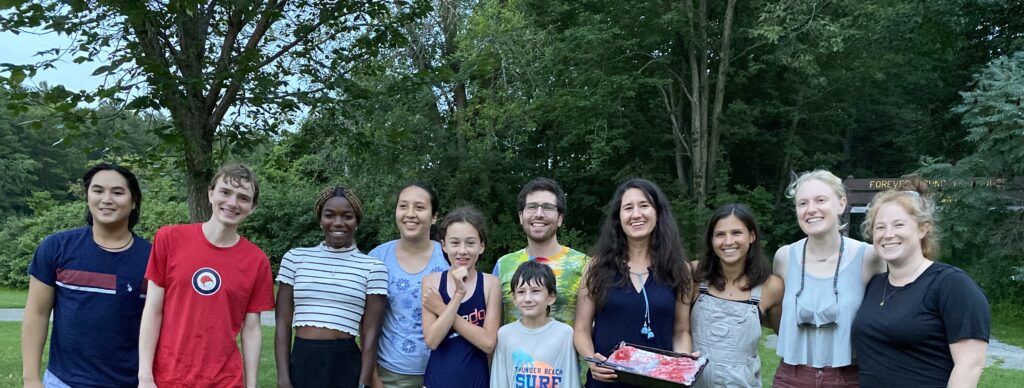After wrapping up his postdoc, Matt will be starting as an assistant professor at UMass Lowell! His lab will focus on zooplankton ecology and adaptation, building on some of his fellowship projects.
Rama, Elizabeth, and Wynne win 1st place at Vermont STEM Fair!
After several months of hard work in the lab, Rama, Elizabeth and Wynne, seniors at South Burlington High School, won the top prize at the Vermont STEM Fair! Their project examined how increased salinity affects copepod thermal limits. They’ll go on to compete at the International Science and Engineering Fair (ISEF) in Los Angeles in May.
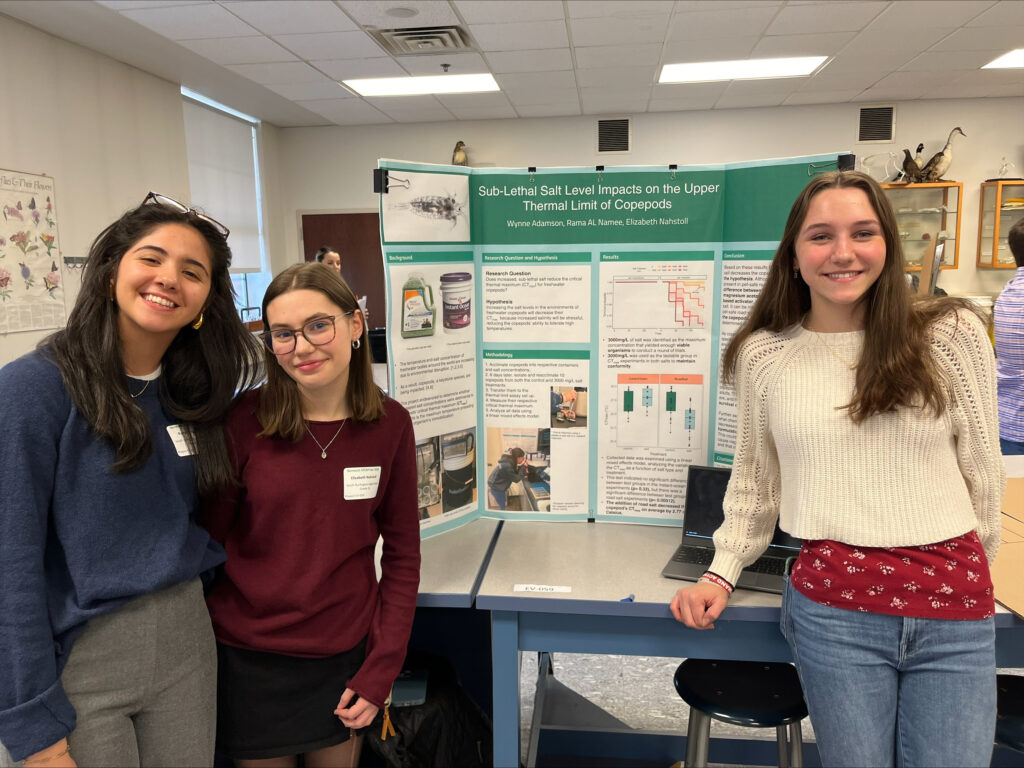
Student Research Conference
Csenge at the Genetics Conference
Csenge had a great time presenting her research at The Allied Genetics Conference (TAGC) in Washington, D.C.! The poster was presenting results of a computational population genetics model that was developed to investigate the fate of an allele that increases the phenotypic variation among the carriers or the offspring of the carriers in the population under different parameter settings.
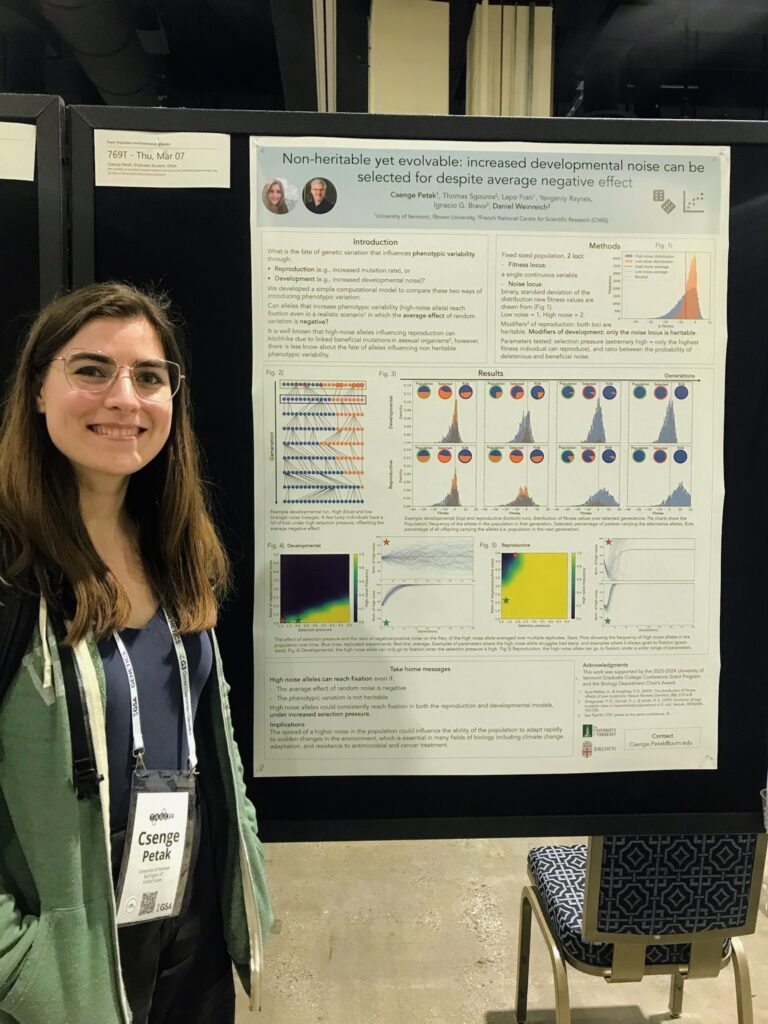
Postdoc position in Molecular Genetics!
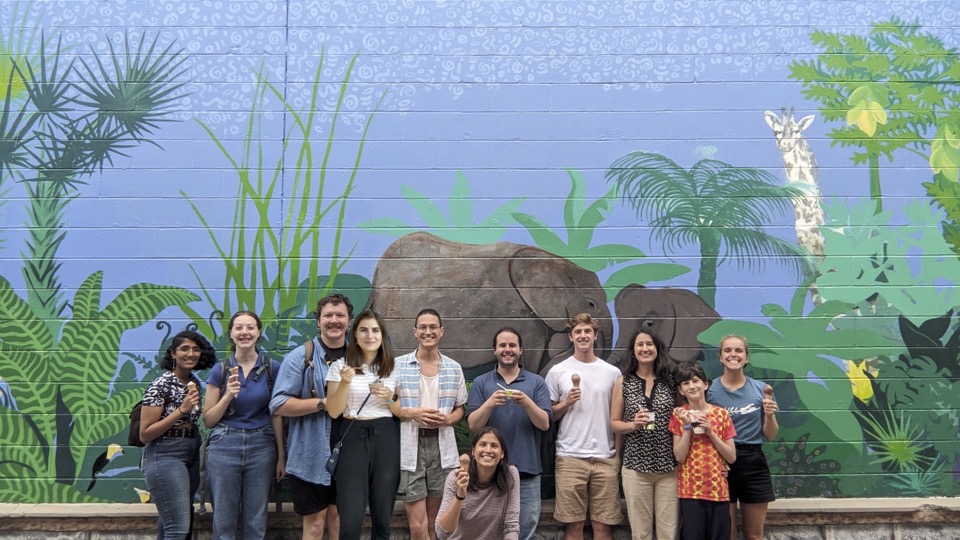
Join us in Vermont!
Postdoctoral Position: Genotype to Phenotype in Sea Urchins
The Pespeni lab is excited to hire a postdoc with expertise in molecular genetics and interests in evolutionary biology, linking genotype to phenotype, and working with marine invertebrates. Project possibilities are open, but we would be particularly excited to recruit someone with interest in validating/testing the function of putatively adaptive mutations identified in the model sea urchin, Strongylocentrotus purpuratus.
Research in the Pespeni lab focuses on understanding the genetic bases of complex traits as well as the processes that maintain this functional genetic variation. We integrate studies of natural populations, where genetic and environmental variation is maximal, with studies in the lab, where genotypes and environmental conditions can be manipulated and controlled, respectively, to increase the power for causal inference. We work with sea urchins and copepods as models, each suited to address key gaps in understanding how evolution shapes the relationship between genotype, phenotype, and environment. We combine studies of genomic variation in the wild with experimental evolution and molecular validation in the lab. We are particularly interested in hiring a Postdoctoral Research Associate with molecular genetic expertise (e.g., reporter assays, CRISPR-Cas9) interested in linking genotype to phenotype to environmental conditions in non-traditional model organisms.
We, in the Pespeni lab, value the diversity of identities, perspectives, and lived experiences that each person brings to the group. We act with intention to nurture a collaborative and supportive environment where we can create, innovate, and thrive as individuals and as a collective. Individuals from diverse educational backgrounds (e.g., biology, mathematics, computer science, physics, environmental and health sciences), women, LGBTQIA+, first-generation college, veterans, and individuals with disabilities and from underrepresented racial, ethnic, gender, socio-economic and cultural groups are strongly encouraged to apply.
The position offers: 1) NIH Postdoctoral pay scale salary starting at $56,484 US plus benefits, 2) the opportunity to be a part of a stimulating, collaborative and collegial research group, department, and broader intellectual community at UVM, 3) the opportunity to mentor graduate and undergraduate students, guest lecture, and take advantage of other professional development trainings, and 4) the opportunity to work closely with the PI on mentoring, data analysis, and writing grants and papers.
Required Qualifications:
- Ph.D. by the time of start date.
- Skills in one or more of the following fields: genetics, biology, evolutionary biology, genomics, population genetics, computational biology, bioinformatics, data science, or marine biology.
- The successful candidate will also have excellent writing and personal communication skills, a demonstrated desire and ability to publish in peer reviewed journals, ability to work in a team or individually, and a commitment to open, reproducible science.
Preferred Qualifications:
- Experience manipulating gene expression or function using molecular genetic tools in any organism.
- Experience working with non-traditional model organisms.
- Genomics, bioinformatics skills.
Initial appointment will be for one year, with the possibility of extension for one or two additional years, contingent on performance and funding. Start date is preferably September 2023, but can be flexible. Remote work options are normally considered, but, due to the nature of the position, being based in Vermont is preferred.
To apply, e-mail a single PDF including a cover letter, a CV, and the names and contact information of three references to Dr. Pespeni (mpespeni@uvm.edu) with the subject: “GtoP Postdoctoral Application”. The cover letter should highlight your interest in the position, your relevant expertise with respect to required and preferred qualifications, project ideas as this position has flexibility, and your short- and long-term career goals. Review of applications will begin August 1, 2023. Informal inquiries prior to applying are welcome.
Apple picking – A fabulous Fall ritual
Congratulations, Dr. Ashlock!!!
Earned an Ice Cream Party!
Summer potluck in the park!
Animated Video on our Collaborative Copepod Research!
Check out this video on our NSF-funded collaborative work studying the capacity of copepods to adapt to global change stressors. Please share broadly!
